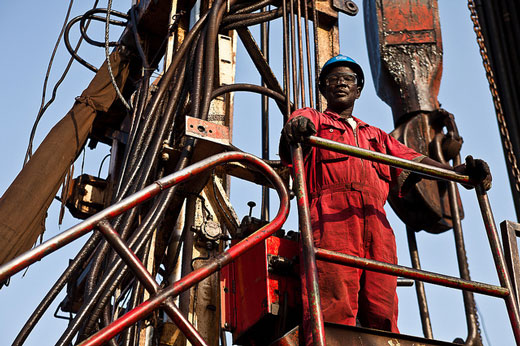
It is difficult to avoid being swept up in the current tide of optimism about Africa and resource development. For once, Africa is not only portrayed by outsiders as a continent of poor people suffering and fighting over civil wars and dependent on good will and aid.
At the same time, the new, positive single story narrative (see, for instance, Robert Rotberg’s recent book Africa Emerges) is based on a set of potential futures which read as if the international business community had discovered a new El Dorado of investment opportunities in Africa.
So let us focus on resource extraction. The storyline is that Africa is broadening the new frontiers of resource development, shifting the geo-strategic energy and mineral map of the world – from sizeable new finds of off-shore oil and gas in East and West Africa, to iron ore reserves in Sierra Leone, Liberia, Congo and Central Africa.
The story goes on to say that a significant proportion of these new resource developments are in contested areas, in regions with a history of conflict.
Optimism – but what has changed?
While not disputing these new developments, the problem with this new narrative is its lack of historical depth. What has really changed? Is it about intensity and volume of revenues? Are these new investments increasingly reaching into so-called fragile countries and in particular remote areas? And perhaps more importantly, are resource developments happening in response to increasing demand, or is this a resource boom and a situation of over-supply? One participant in a recent meeting I attended at Chatham House suggested that the reason why the Kenyan government is racing so urgently to develop the Turkana oil reserves is precisely because they fear the discovery of cheaper new oil reserves elsewhere.
The answers to this set of questions would enable us to properly understand the extent to which the situation has really changed.
This resource boom narrative is now often associated with an optimistic approach that attempts to criticize or transcend the ‘resource curse’ story. So how beneficial are natural resources for development and peacebuilding? The problem is that experts are struggling to find good examples. The Indonesia-Aceh peace process or the South Sudan ‘well planned but badly implemented’ process are often referred to as good examples, but with limited enthusiasm.
‘Business for peace’
It is not surprising that the potential for business to play a role in peacebuilding, and the conditions under which this can happen, is becoming a key policy debate – given the so-called resource boom and its focus on ‘fragile states’. The fact that resource extractive businesses are the first type of business to get involved in post-conflict (if not conflict) situations is also used as another justification to think about their potential role.
The slogan ‘business for peace’ raises a few eyebrows, questioning whether businesses could do anything more than corporate social responsibility. In fact, as another delegate at the Chatham House meeting mentioned, sticking to the ‘do no harm’ rule would already be a considerable advance.
The point here is not to be overly critical about business, but rather to question the expectations and responsibilities put upon ‘business for peace’ narratives.
Conflict sensitivity is not a realistic option for businesses as, very much like donors, they are political actors. Their business operation forces them to align with one or other of the parties in the conflict. Business cannot truly be perceived, or act as, an honest independent broker. Although one should encourage any moves towards peacebuilding, the narrative ‘business for peace’ may be harmful in hiding the responsibilities of governments (and potentially donors) to work for redistribution and social cohesion.
Jeremy Allouche is a Research Fellow at IDS and has recently begun working on a new project, Large development investments and local peacebuilding in Africa: Building and sustaining peace at the margins.
Photo: Sudanese Oil Workers by ENOUGH Project on Flickr (by-nc-nd)